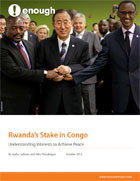
Relations between Congo and Rwanda have been a critical factor in making Congo’s war the deadliest in the world since World War II. A new Enough Project report, “Rwanda’s Stake in Congo: Understanding Interests to Achieve Peace” contends that focusing on this relationship by addressing Rwanda’s core security, economic, and political interests, as well as pushing for institutional reforms in Congo, will be crucial in efforts to stabilize the region.
The aftermath of the Rwandan genocide spilled into Congo in the mid-1990s, exacerbating preexisting intercommunal tensions and conflict. These tensions, coupled with the Congolese government’s deep corruption and bad governance, have created conditions in which the Congolese army and a host of militias have operated with impunity and destabilized eastern Congo. Furthermore, Rwanda’s direct intervention in Congo at times and its periodic support for armed groups in eastern Congo have been central drivers of continuing conflict, states the report.
The report argues that addressing these interests will be critical to achieving peace. Rwanda’s core concerns include what it believes to be an existential security threat posed by the Democratic Forces for the Liberation of Rwanda, or FDLR, the Hutu extremist armed group based in eastern Congo, which has attacked Rwanda four times over the past year. The FDLR’s leaders were some of the alleged perpetrators of the Rwandan genocide and they have also, at times, received support from elements of the Congolese army. A coordinated approach to containing the FDLR therefore requires factoring in not only Congo’s security interests but also Rwanda’s concerns.
“Rwanda and Congo are elephants in each other's living rooms," says Enough Project Co-Founder John Prendergast. “Until that relationship is addressed, and the interests that underlie it, there will be blood in eastern Congo."
Enough Project Senior Policy Analyst Sasha Lezhnev added:
"The key to unlocking peace is to expand the economic pie for Congo, Rwanda, and the region by bringing in a much more robust private sector that practices responsible investment in conflict-free minerals. Right now, the fighting is over surface-level mines, but the fact is that there are billions of dollars worth of mining deposits in the ground that lie undeveloped. If the U.N. and U.S. envoys build the right incentives for cooperation in the peace process, this investment will benefit all parties. Some will benefit from financial services, others will benefit from mining revenues, and others will benefit from new roads and infrastructure. Rwanda, Congo, and the region will then be financially invested in peace instead of war.”
A more viable coordinated approach to managing Congo’s resource wealth must also factor in Rwanda’s economic interests in natural resources, land, and trade. For example, Rwanda depends on the regional minerals trade to reduce its trade deficit. It has a domestic mining sector, but conditions in Congo also create incentives for actors to circumvent the formal economy and engage in illicit cross-border trade. Such trade enriches smugglers and fuels further conflict. Effectively addressing these complex economic and security issues and pushing for institutional reform in Congo requires engaging actors on both sides of the Congo-Rwanda border.
While previous international peace initiatives have largely circumvented Rwanda’s role in the continuing conflict, this report emphasizes that any solution must address Rwandan economic and security concerns and push for Congo’s institutional reforms in order to be successful. The political will for peace and cooperation will develop only when these two states begin to invest financially in regional economic integration and work together on certain security issues while critical institutional reforms take place in Congo. Combining a conflict-free mining sector and improved infrastructure in Congo with Rwanda’s attractiveness for potential investments could initiate a process of transformation, argues the report.
The report recommends five steps for the U.N. and U.S. Special Envoys Robinson and Feingold:
1. Work with African leaders in the African Union, South African Development Community, and the ICGLR to set up the next stage of the peace process: negotiations among regional states, inclusive of civil society, over the key underlying drivers of the war.
2. Make regional economic cooperation a centerpiece of the peace process. Specifically, press Congo and Rwanda to speed up the regional ICGLR minerals certification process. Also, work with the World Bank and regional organizations to speed up development of regional economic-integration projects, particularly for roads and electrification in eastern Congo.
3. Emphasize that any verified state support from any government in the region to any armed group will result in targeted sanctions or other escalating repercussions.
4. Work to ensure that the U.N. Intervention Brigade addresses the region’s core security threats, particularly M23, the FDLR, and the ADF.
5. Support increased efforts at accountability for war crimes and crimes against humanity, both through the International Criminal Court and domestic processes.

